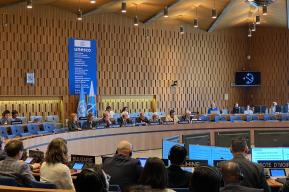Event
Gender Transformative Policy to Advance Digital Inclusion

In line with IFAP Strategic Plan 2023-2029, the Information for All Programme (IFAP) invites its partners and experts to a webinar series offering practical solutions, policy recommendations, lessons learned and good practices towards building inclusive Knowledge Societies in the digital age. The webinar series will present insights in the six priority areas of IFAP, namely: Information for Development, Information Literacy, Information Preservation, Information Ethics, Information Accessibility and Multilingualism. Through meaningful discourse and actionable insights, this IFAP webinar series aims to incentivize actions that lead to transformative change and advance equitable opportunities for al in the digital space.
The first in the series of webinars will be organized in cooperation with the Global Digital Inclusion Partnership (GDIP) and is titled "Gender Transformative Policy to Advance Digital Inclusion". The webinar will be held marking the "International Girls in ICT Day" proclaimed by the International Telecommunication Union (ITU) and celebrated on the 4th Thursday in April. This year's Girls in ICT Day will highlight the theme "Leadership" to inspire and empower girls to pursue opportunities in science, technology, engineering, and mathematics.
This webinar aims to highlight strategies tailored to address the unique challenges faced by women and girls in accessing and utilizing digital platforms. Exploring policy frameworks to amplifying good practices, it will advocate for policies that bridge the digital divide and prioritize the diverse needs and voices of all individuals.
The webinar also aims at providing a follow-up to the discussion of UN Commission on the Status of Women (CSW) 2024 priority theme, "accelerating the achievement of gender equality and the empowerment of all women and girls by addressing poverty and strengthening institutions and financing with gender perspective". In today's digital landscape, gender-responsive policies are paramount for fostering digital inclusion.
In line with its Medium-Term Strategy (2022-2029), UNESCO addresses the digital gender gap by promoting gender equality in emerging technologies, and mainstreaming gender equality in promoting universal access to information. The recent UNESCO study “Challenging Systematic Prejudices: An Investigation into Bias Against Women and Girls in Large Language Models” underscores UNESCO's commitment to promoting inclusivity and combating bias in digital spaces by fostering dialogue, research, and initiatives aimed at mitigating systemic prejudices.
Draft Agenda
Introduction remarks by Mr. Pablo MEDINA JIMÉNEZ, IFAP Chair
Presentation of UNESCO's new publication on “Challenging Systematic Prejudices: An Investigation into Bias Against Women and Girls in Large Language Models” by Mr. Cédric Wachholz, Chief of Digital Policies and Digital Transformation Section, UNESCO
Speakers:
Ms. Sonia Jorge, Executive Director, GDIP
Ms. Onica Makwakwa, Executive Director, GDIP
Ms. Ingrid Brudvig, Senior Research Manager, GDIP
Ms. Mariam Keburia, Business and Technology University, Georgia
Mr. Cordel Green, Chair of IFAP Working Group Information Accessibility
Questions & Answers
Closing remarks by Ms. Danielle Cliche, Gender Equality Division ni the Office of the Director-General, UNESCO.
Moderated by Ms. Xianhong Hu, Programme Specialist of IFAP Secretariat, Communication and Information Sector, UNESCO





